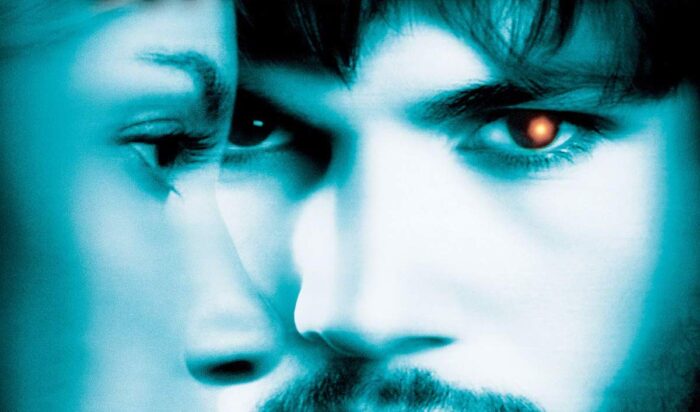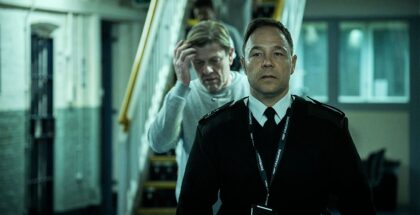Time Travel Thursday: The Butterfly Effect (2004)
Review Overview
Time travel tropes
8The Butterfly Effect
8Entertainingly trashy nonsense
6Matthew Turner | On 29, Oct 2020
Directors: Eric Hess, J. Mackye Gruber
Cast: Ashton Kutcher, Amy Smart, Eric Stoltz, Elden Henson, Ethan Suplee, Logan Lerman
Certificate: 15
Watch The Butterfly Effect online in the UK: Amazon Prime
Has Tenet whetted your appetite for more time travel titilation? Transport yourself no further than Time Travel Thursdays, our column devoted to time travel movies. It’s on Thursdays.
Co-directed by Eric Hess and J. Mackye Gruber, The Butterfly Effect has an extremely intriguing premise and ticks many of the boxes associated with the time travel genre. It might be trashy nonsense, but it’s also undeniably entertaining, with a couple of surprises up its sleeve.
Ashton Kutcher plays Evan Treborn (a play on “Event Reborn” – amusingly, the character was originally supposed to be named Chris), a college student who repeatedly suffered from memory loss and blackouts when he was a kid, usually just as something horribly traumatic was about to happen. When he discovers that he can travel back in time to those blackouts by reading his own journals, Evan attempts to change things for himself and his friends – including former childhood sweetheart Kayleigh (Amy Smart) and institutionalised Lenny (Elden Henson) – by intervening at the crucial moment. However, as the title suggests, things go horribly wrong and Evan repeatedly ends up making things far, far worse.
There’s no time machine per se in The Butterfly Effect – the film waves away Evan’s condition as an inherited curse – but at least the time travel effects are smartly handled and well thought out. In particular, there’s a nicely directed sense of reality folding in as he travels back to the past, followed by a nosebleed-inducing rush of new memories when he returns to an altered timeline.
What’s interesting, however, is the way the movie completely disregards the fact that each time he travels, Evan is both killing off one timeline and creating a whole new one. In that regard, it’s almost comically self-centred and the film doesn’t even come close to addressing it.
In fairness, The Butterfly Effect provides the perfect illustration of its title, namely the idea that one small action in the past can have catastrophic consequences in the future. It’s worth pointing out, too, that under all its trashy genre trappings the film does actually have a serious point to make and something to say about the lasting damage that abuse and trauma can do to children.
The tone of the film is extremely odd. It’s so dark in places that you question whether it’s at least partly intended as a black comedy, particularly when Evan wakes up to discover that -spoiler alert- everyone else in his life is happy, but he’s lost his arms and his mum has cancer. The film goes really heavy on the trauma for a supposedly fun time travel flick too – all the blackout-inducing incidents are deeply disturbing.
Kutcher is a fairly limited actor (he can only convincingly do one emotion: confused), but his performance mostly works here, aided considerably by fast-paced direction from Hess and Gruber. However, you have to wonder whether the reason the film cops out of a fairly significant big emotional moment at the end is because the lead actor wasn’t quite up to the job.
The support cast are excellent, though, particularly Amy Smart (displaying great range by playing several wildly different iterations of her character) and Ethan Suplee (whose character is sadly ditched way too early), as well as a deeply creepy turn from Eric Stoltz as Kayleigh’s dad.
Ultimately, The Butterfly Effect works best if you don’t think about it too hard. For one thing, it leaves a crucial question intriguingly open – namely, if Evan is inhabiting his own blacked out consciousness when he time travels to the past, what was happening the first time round? We see each of the incidents in the film in lengthy flashback sequences before revisiting them later, and in at least one of them (involving a knife), it’s strongly suggested that the whole thing is a closed loop and that the blackouts were caused by Evan time travelling in the first place. If that makes your brain hurt, then, yeah, it’s best not to think about it too much.
The film also deserves praise for its ending, which is impressively non-Hollywood, at least by traditional standards. In fact, it turns out that a number of different, more expected endings were filmed, so fair play to the producers for sticking to their guns and not buckling under pressure. That said, the ending on the Director’s Cut is proper horror movie stuff and it’s hard not to wish they’d gone with that version instead.
The Butterfly Effect is available to watch online on Amazon Prime Video as part of a Prime membership or a £5.99 monthly subscription.






















